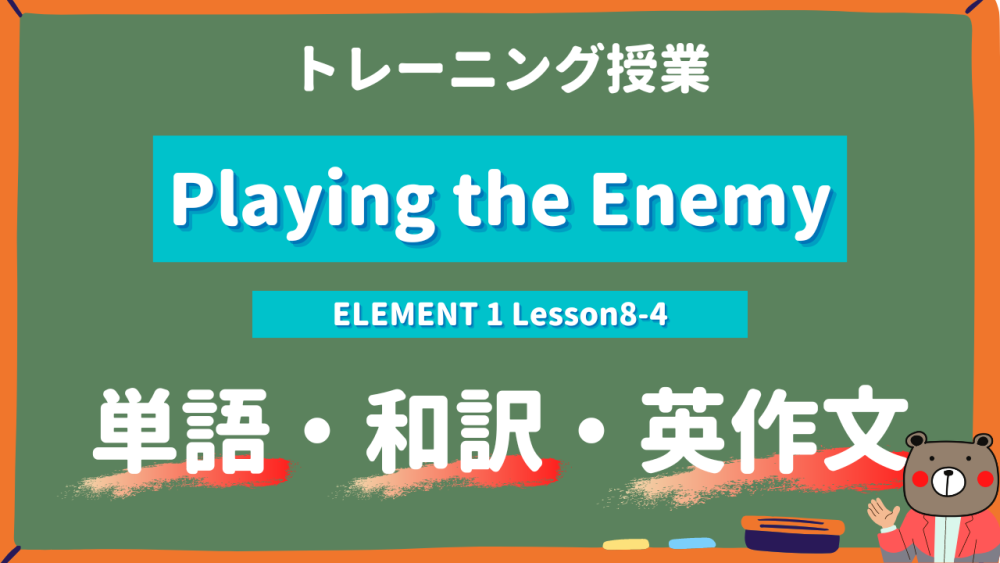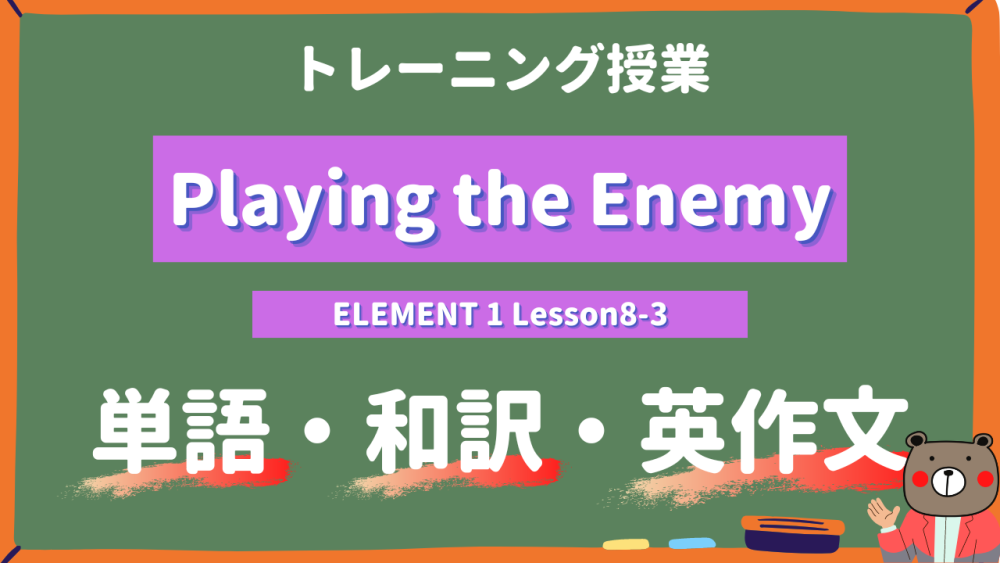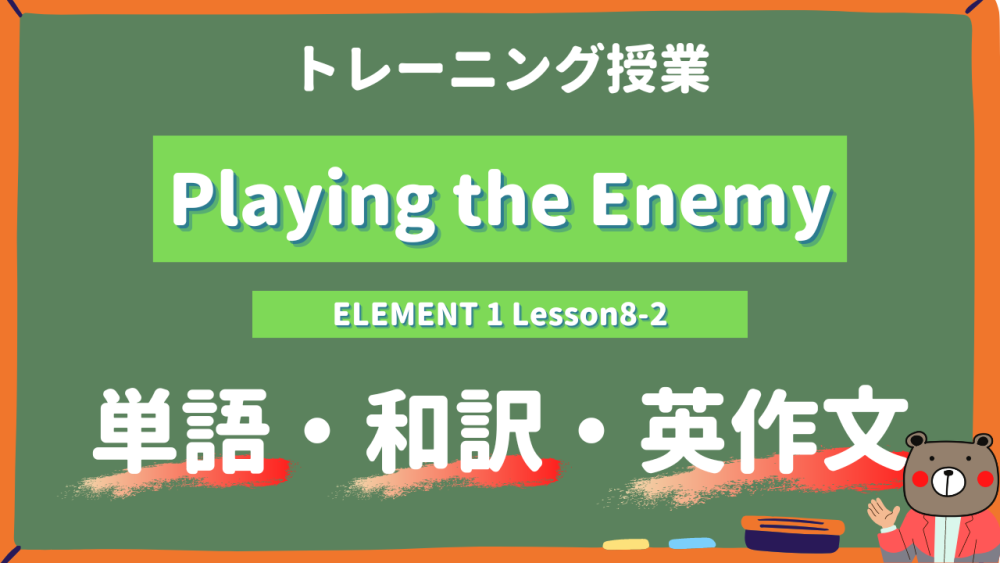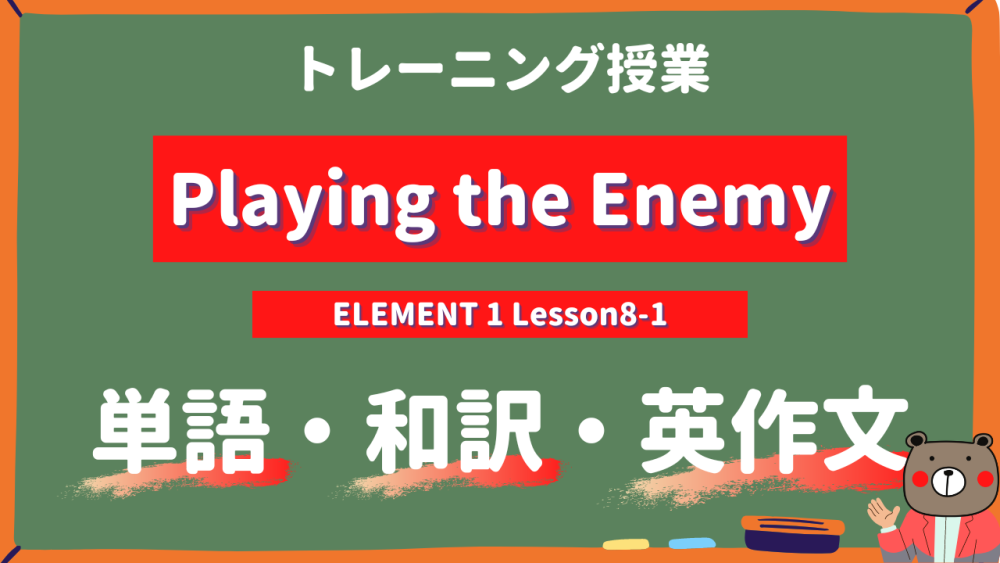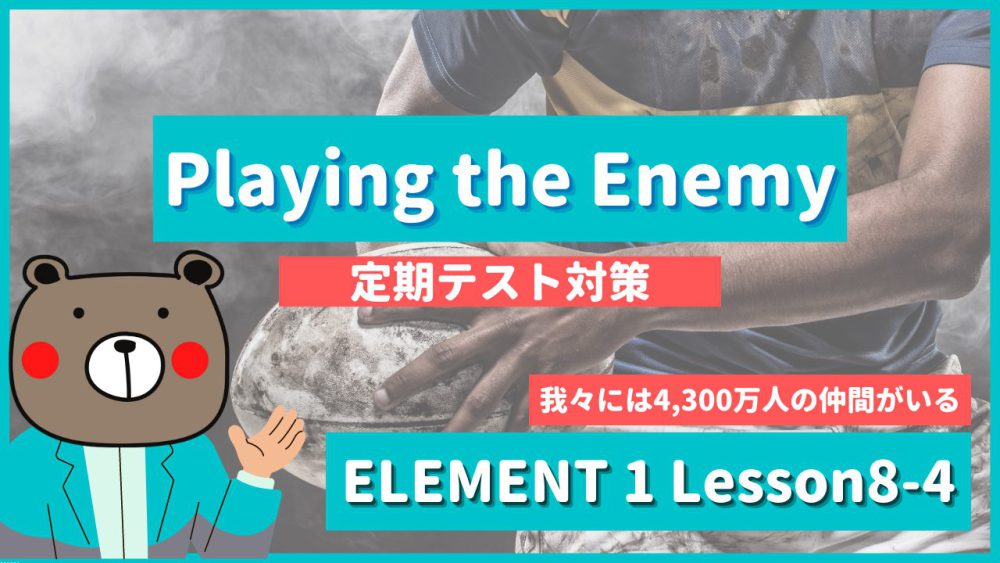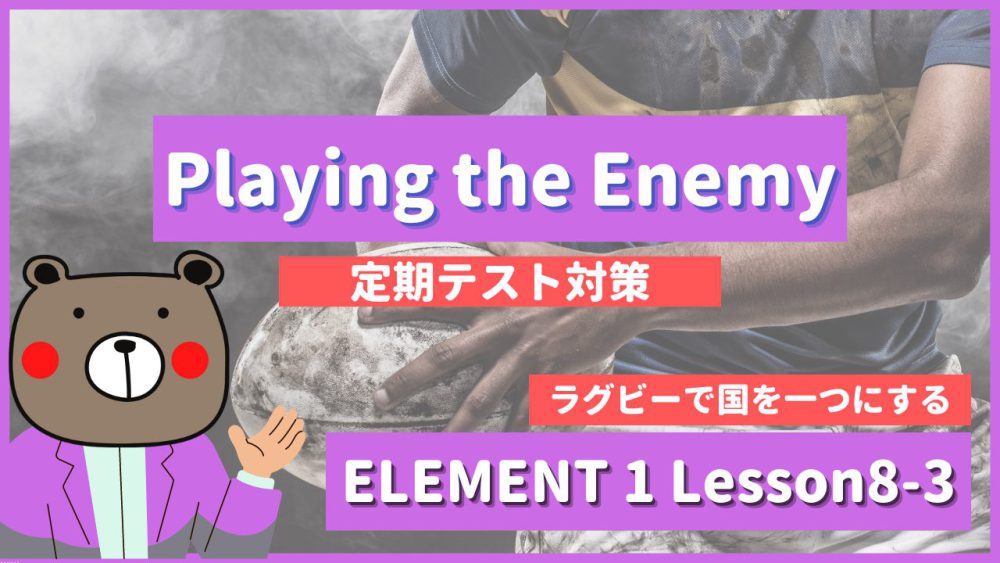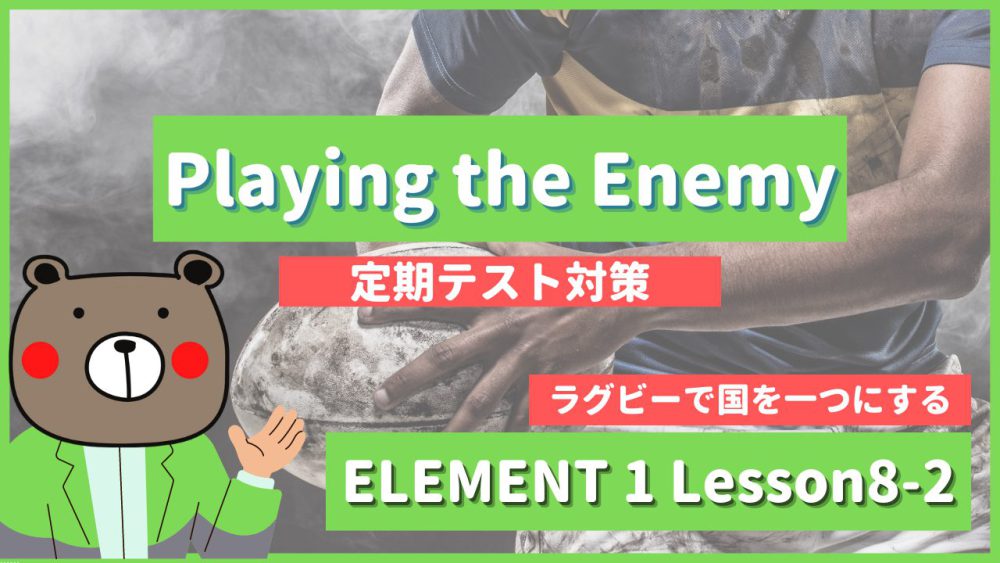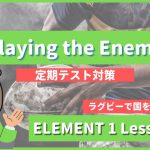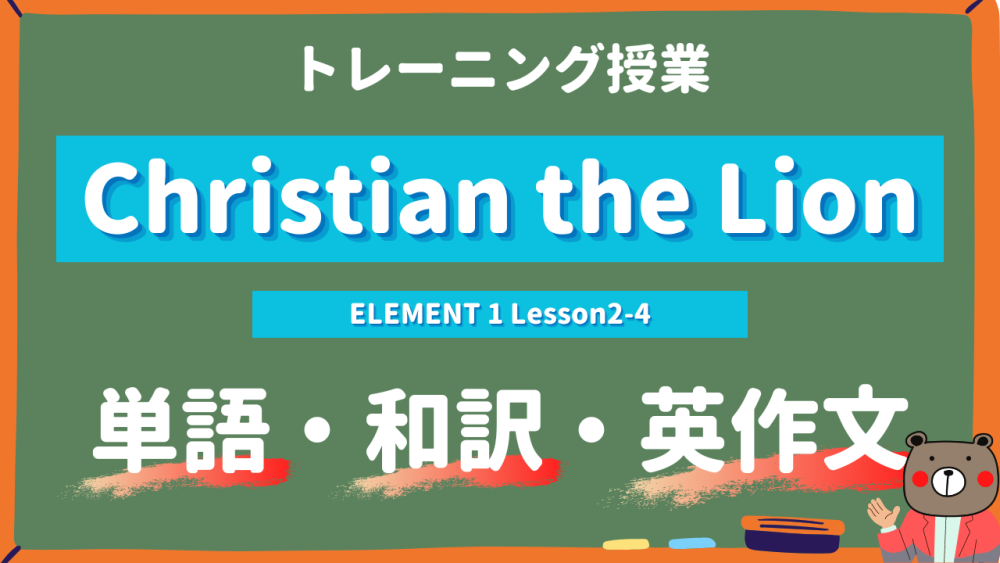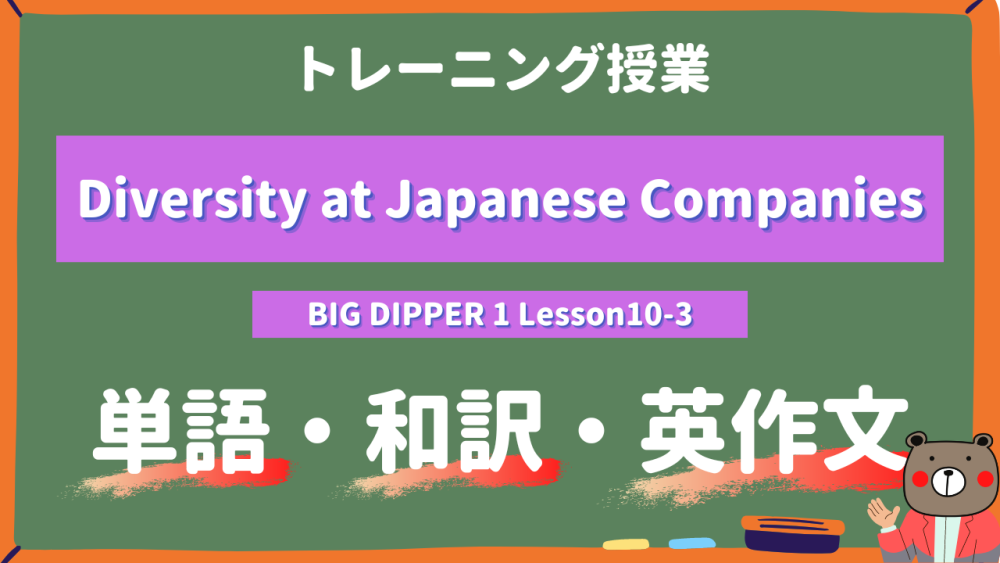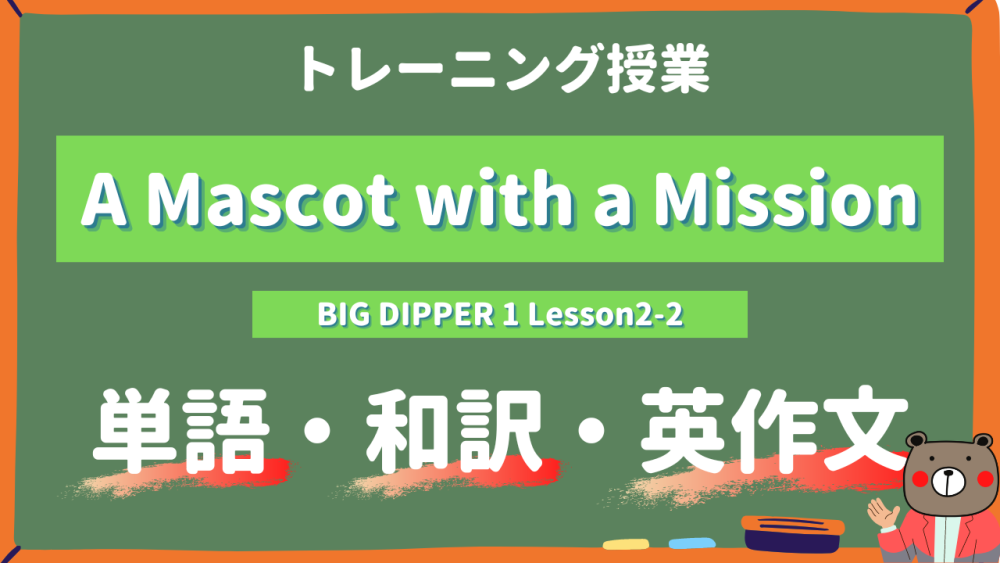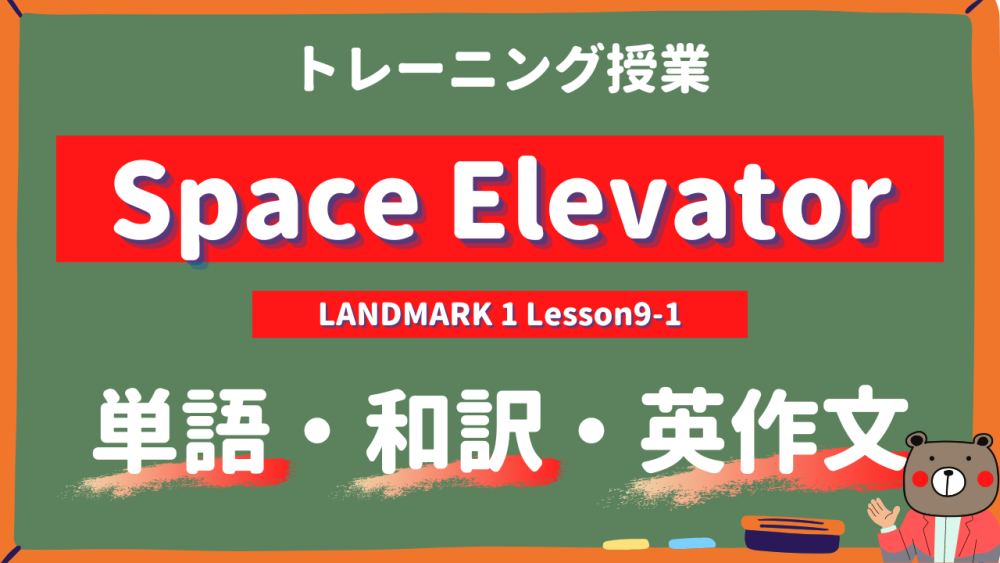▼音声で学びたい方はこちらへ🐻
現在撮影中❗️
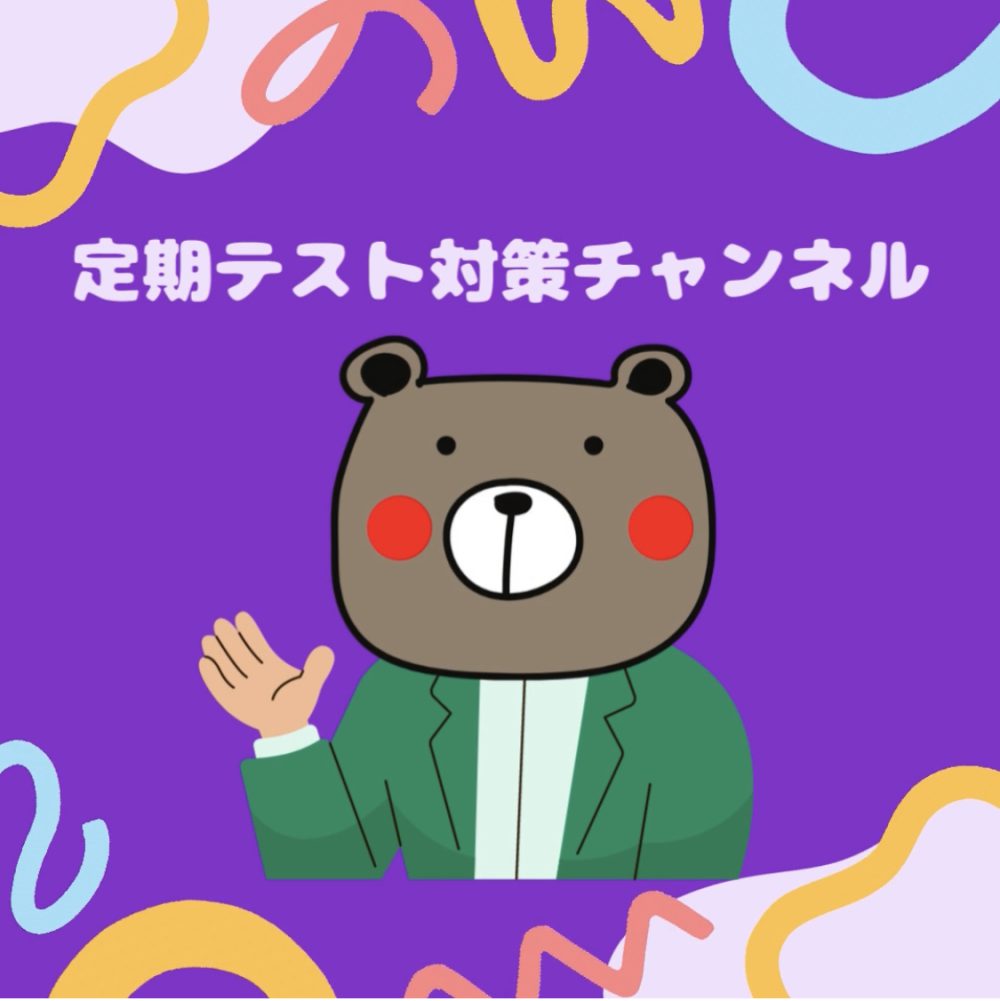
▼ELEMENT1-高1《Lesson8》はこちらから🐻
- 授業前にひとこと
- 勉強のポイント
- 本文&和訳
- 重要単語
- 重要ポイント
- 【1】The final game of the 1995 Rugby World Cup in South Africa was one of the most exciting international games for most people in the world.
- 【2】However, it meant more than that to South Africans.
- 【3】All the people of the country, of many different races, were watching the game with much hope for the future.
- 【4】People who were once enemies were cheering together for their national team.
- 【5】In South Africa, black people had long been discriminated against under a system called apartheid.
- 【6】Their education, employment, and residences were strictly separated from white people.
- 【7】They could not receive good education, find work, or live in certain areas that were only for white people.
- 【8】Eventually, people who did not like this policy grew in number both domestically and overseas.
- 【9】Nelson Mandela was leading a group of such people when he was arrested by the police and put in prison.
- 【10】He was in captivity in a small cell for 27 years until he was finally freed in 1990.
- 【11】In 1994, general elections were held, in which all citizens of all races were allowed to vote for the first time in the history of South Africa, and Mandela was elected president of South Africa.
- 【12】In that same year, apartheid was abolished, and a new national flag was designed as a symbol of the new South Africa.
- 【13】However, black people could not forget about the hardship they had been suffering for many years.
- 【14】At the same time, white people were afraid that black people would strike back at them.
- 【15】They were far from becoming friends.
- 【16】In fact, they were only a step away from war.
- 【17】To solve this conflict, Mandela thought he could use sports to unify the nation and make them feel closer to one another.
- 【18】He chose rugby.
- 【19】In South Africa, rugby was a “white people’s sport.”
- 【20】Black people hated the Springboks, South Africa’s national team, so much that they did not cheer for their team but cheered for foreign teams instead.
- 【21】Mandela thought, “If people of different colors played a sport together, or cheered for the same team together, they could become more intimate.”
授業前にひとこと


今回は、ELEMENT1-高1《Lesson8》について扱っていきます❗️
Lesson8のタイトルは…🐻
Playing the Enemy
という「スポーツは国を一つにできるか」というお話です。
ちなみに、このLessonでメインで理解したい文法事項は…
仮定法過去 / 仮定法過去完了 (if S did, if S had done)
過去完了進行形 (had been Ving)
です❗️
さて、いつも授業前に説明することですが…
⇧に載せてあります『単語・和訳・英作文トレーニング』をテスト1週間前から毎日やってみてください❗️曖昧な理解がなくなり、成績が爆伸びします!!
コミュ英以外の定期テスト対策は?
現代文の定期テスト対策は こちら から
古文の定期テスト対策は こちら から
漢文の定期テスト対策は こちら から
teite channel をもっと活用する


▷ 解説記事のリクエスト
▷ 新着情報のキャッチ
▷ 定期テスト予想問題
▷ オリジナルグッズの購入
ができるようになっています🐻
teite channel の 公式LINEアカウント はこちら
勉強のポイント
①本文は、南アフリカ共和国でのアパルトヘイトにおける人種差別と、それがもたらした人種間の軋轢を説明していることを理解する。
②単語・重要ポイントをインプットする。
③仮定法過去 / 仮定法過去完了, 過去完了進行形 ついて理解する。
本文&和訳
本文(Scene1)
【1】The final game of the 1995 Rugby World Cup in South Africa was one of the most exciting international games for most people in the world.
1995年の南アフリカラグビーW杯の決勝戦は、世界中の多くの人々にとって、最も刺激的な試合の一つでした。
However, it meant more than that to South Africans.
しかし南アフリカの人々にとって、それはただのそれ(試合)ではなかった。
All the people of the country, of many different races, were watching the game with much hope for the future.
その国の、多くの異なる人種の全ての人々は、未来への大きな希望とともに試合を見ていました。
People who were once enemies were cheering together for their national team.
かつて敵だった人々は、彼らの代表チームのために、一緒に応援していました。
【2】In South Africa, black people had long been discriminated against under a system called apartheid.
南アフリカでは、黒人は長い間アパルトヘイトと呼ばれる政策の下に、人種差別されていました。
Their education, employment, and residences were strictly separated from white people.
彼らの教育、雇用、居住は、白人と厳しく区別されていました。
They could not receive good education, find work, or live in certain areas that were only for white people.
彼らは良い教育を受けることや仕事を探すこと、白人のためだけの地域に住むことはできなかった。
Eventually, people who did not like this policy grew in number both domestically and overseas.
次第に、この政策を好まない人々の数は、国内、海外の両方で増えてきました。
Nelson Mandela was leading a group of such people when he was arrested by the police and put in prison.
ネルソン・マンデラは、警察に逮捕され刑務所に入れられたとき、このような人々のグループを率いていました。
He was in captivity in a small cell for 27 years until he was finally freed in 1990.
1990年に最終的に釈放されるまで、彼は27年間小さい独房で囚われの身でした。
【3】In 1994, general elections were held, in which all citizens of all races were allowed to vote for the first time in the history of South Africa, and Mandela was elected president of South Africa.
1994年、総選挙が開催され、そしてそこでは南アフリカの歴史で初めて、全ての人種の全ての市民が投票するのを許されました、そしてマンデラが南アフリカの大統領に選ばれました。
In that same year, apartheid was abolished, and a new national flag was designed as a symbol of the new South Africa.
同年、アパルトヘイトは廃止され、新しい国旗が新しい南アフリカの象徴として作られました。
However, black people could not forget about the hardship they had been suffering for many years.
しかし、黒人は長年苦しんできた苦難について忘れることができませんでした。
At the same time, white people were afraid that black people would strike back at them.
同じ時期、白人は黒人が自分たちに報復をするつもりだと恐れていました。
They were far from becoming friends.
彼らは決して友達になっていませんでした。
In fact, they were only a step away from war.
実際、彼らは戦争になるあと一歩のところにいました。
【4】To solve this conflict, Mandela thought he could use sports to unify the nation and make them feel closer to one another.
この衝突を解決するために、マンデラはスポーツで国家を一つにし、お互いをより身近に感じさせることを考えました。
He chose rugby.
彼はラグビーを選びました。
In South Africa, rugby was a “white people’s sport.”
南アフリカでは、ラグビーは「白人のスポーツ」でした。
Black people hated the Springboks, South Africa’s national team, so much that they did not cheer for their team but cheered for foreign teams instead.
黒人はスプリングボクスという(が愛称の)南アフリカ共和国代表チームがとても嫌いだったので、彼らは代表チームを応援するのではなく、代わりに外国チームを応援してました。
Mandela thought, “If people of different colors played a sport together, or cheered for the same team together, they could become more intimate.”
マンデラはこう考えました、「もし違う人種が一緒にスポーツをしたり、一緒に同じチームを応援するなら、彼らはもっと親密になることができるだろうに」と。
重要単語


V : 動詞 , Ving : 動名詞 , Vpp : 過去分詞, O:目的語, C:補語
| final game | 最終戦、決勝戦 |
| Rugby World Cup | ラグビーW杯 |
| South Africa | 南アフリカ共和国 |
| international | 国際的な |
| more than A | ただのAではない |
| race | 人種 |
| enemy | 敵 |
| cheer | 〜を応援する |
| national | 国家の |
| discriminate | 〜を差別する |
| under A | Aの下で |
| apartheid | アパルトヘイト |
| education | 教育 |
| employment | 雇用 |
| residence | 居住 |
| strictly | 厳しく |
| separate | 〜を区別する |
| separate A from B | AをBと分ける、区別する |
| certain | ある、とある |
| eventually | 次第に |
| policy | 政策 |
| grow in number | 数が増える |
| domestically | 国内で |
| overseas | 海外で |
| Nelson Mandela | ネルソン・マンデラ |
| arrest | 〜を逮捕する、捕まえる |
| put O in ~ | Oを〜に入れる |
| prison | 刑務所 |
| captivity | 監禁、束縛 |
| be in captivity | 囚われの身である |
| cell | 独房 |
| free | 〜を釈放する |
| general | 一般的な |
| election | 選挙 |
| general election | 総選挙、国政選挙 |
| citizen | 市民 |
| allow O to V | OがVするのを許す |
| vote | 投票する |
| for the first time | 初めて |
| elect | 〜を選ぶ |
| president | 大統領 |
| abolish | 〜を廃止する |
| flag | 旗 |
| design A as B | BとしてAを作る、制作する |
| hardship | 苦難、困難 |
| suffer from ~ | 〜に苦しむ |
| be afraid that S V | SがVすると恐れる |
| strike back | 報復する、仕返しする |
| far from | 決して〜ない |
| a step away from ~ | 〜まであと一歩 |
| solve | 〜解決する |
| conflict | 衝突、対立 |
| unify | 〜を統一する |
| nation | 国家 |
| one another | お互いに |
| hate | 〜を嫌う |
| Springboks | スプリングボクス |
| so ~ that S V | とても〜なので、SがVする |
| instead | 代わりに |
| intimate | 親密な、仲の良い |
重要ポイント
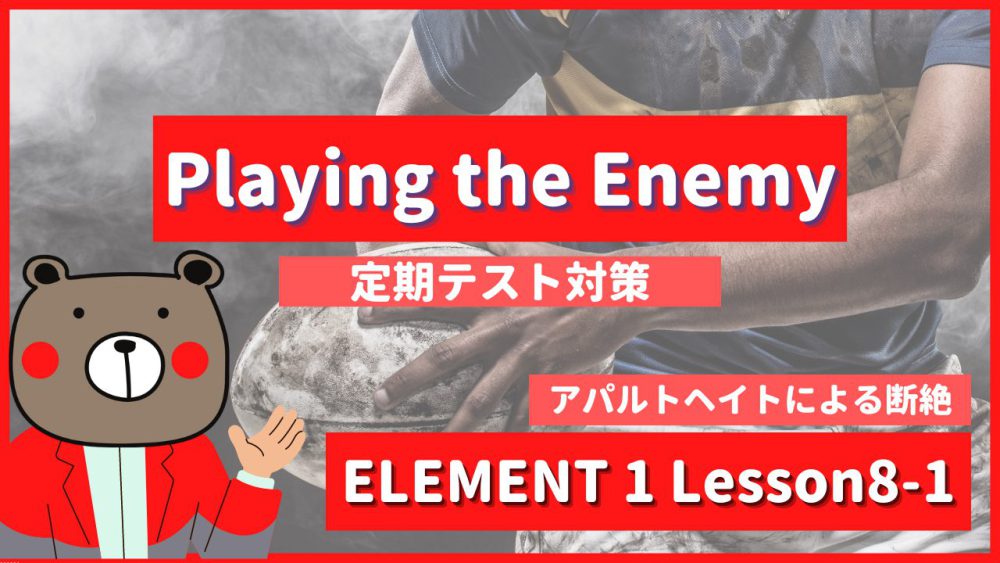

「ピンク」=重要ポイント
▼記号について
V : 動詞 Ving : 動名詞 Vpp : 過去分詞
【 】名詞句・節 〈 〉形容詞句・節 ( )副詞句・節
S:主語 O:目的語 C:補語 M:副詞
【1】The final game of the 1995 Rugby World Cup in South Africa was one of the most exciting international games for most people in the world.
《和訳》
1995年の南アフリカラグビーW杯の決勝戦は、世界中の多くの人々にとって、最も刺激的な試合の一つでした。
《重要ポイント》
ここまで執筆完了❗️日々解説を加えていきます!


teite channel の 公式LINEアカウント はこちら
【2】However, it meant more than that to South Africans.
《和訳》
しかし南アフリカの人々にとって、それはただのそれ(試合)ではなかった。
《重要ポイント》
【3】All the people of the country, of many different races, were watching the game with much hope for the future.
《和訳》
その国の、多くの異なる人種の全ての人々は、未来への大きな希望とともに試合を見ていました。
《重要ポイント》
【4】People who were once enemies were cheering together for their national team.
《和訳》
かつて敵だった人々は、彼らの代表チームのために、一緒に応援していました。
《重要ポイント》
【5】In South Africa, black people had long been discriminated against under a system called apartheid.
《和訳》
南アフリカでは、黒人は長い間アパルトヘイトと呼ばれる政策の下に、人種差別されていました。
《重要ポイント》
【6】Their education, employment, and residences were strictly separated from white people.
《和訳》
彼らの教育、雇用、居住は、白人と厳しく区別されていました。
《重要ポイント》
【7】They could not receive good education, find work, or live in certain areas that were only for white people.
《和訳》
彼らは良い教育を受けることや仕事を探すこと、白人のためだけの地域に住むことはできなかった。
《重要ポイント》
【8】Eventually, people who did not like this policy grew in number both domestically and overseas.
《和訳》
次第に、この政策を好まない人々の数は、国内、海外の両方で増えてきました。
《重要ポイント》
【9】Nelson Mandela was leading a group of such people when he was arrested by the police and put in prison.
《和訳》
ネルソン・マンデラは、警察に逮捕され刑務所に入れられたとき、このような人々のグループを率いていました。
《重要ポイント》
【10】He was in captivity in a small cell for 27 years until he was finally freed in 1990.
《和訳》
1990年に最終的に釈放されるまで、彼は27年間小さい独房で囚われの身でした。
《重要ポイント》
【11】In 1994, general elections were held, in which all citizens of all races were allowed to vote for the first time in the history of South Africa, and Mandela was elected president of South Africa.
《和訳》
1994年、総選挙が開催され、そしてそこでは南アフリカの歴史で初めて、全ての人種の全ての市民が投票するのを許されました、そしてマンデラが南アフリカの大統領に選ばれました。
《重要ポイント》
【12】In that same year, apartheid was abolished, and a new national flag was designed as a symbol of the new South Africa.
《和訳》
同年、アパルトヘイトは廃止され、新しい国旗が新しい南アフリカの象徴として作られました。
《重要ポイント》
【13】However, black people could not forget about the hardship they had been suffering for many years.
《和訳》
しかし、黒人は長年苦しんできた苦難について忘れることができませんでした。
《重要ポイント》
【14】At the same time, white people were afraid that black people would strike back at them.
《和訳》
同じ時期、白人は黒人が自分たちに報復をするつもりだと恐れていました。
《重要ポイント》
【15】They were far from becoming friends.
《和訳》
彼らは決して友達になっていませんでした。
《重要ポイント》
【16】In fact, they were only a step away from war.
《和訳》
実際、彼らは戦争になるあと一歩のところにいました。
《重要ポイント》
【17】To solve this conflict, Mandela thought he could use sports to unify the nation and make them feel closer to one another.
《和訳》
この衝突を解決するために、マンデラはスポーツで国家を一つにし、お互いをより身近に感じさせることを考えました。
《重要ポイント》
【18】He chose rugby.
《和訳》
彼はラグビーを選びました。
《重要ポイント》
【19】In South Africa, rugby was a “white people’s sport.”
《和訳》
南アフリカでは、ラグビーは「白人のスポーツ」でした。
《重要ポイント》
【20】Black people hated the Springboks, South Africa’s national team, so much that they did not cheer for their team but cheered for foreign teams instead.
《和訳》
黒人はスプリングボクスという(が愛称の)南アフリカ共和国代表チームがとても嫌いだったので、彼らは代表チームを応援するのではなく、代わりに外国チームを応援してました。
《重要ポイント》
【21】Mandela thought, “If people of different colors played a sport together, or cheered for the same team together, they could become more intimate.”
《和訳》
マンデラはこう考えました、「もし違う人種が一緒にスポーツをしたり、一緒に同じチームを応援するなら、彼らはもっと親密になることができるだろうに」と。
《重要ポイント》


これで全て終了です❗️
「ELEMENT1-高1《Lesson8-1 | Playing the Enemy | p110》」おつかれさまでした🐻
仮定法過去 / 仮定法過去完了, 過去完了進行形 だけでなく、知らない熟語や構文が出てきたり、単語のレベルも徐々に上がってきて、少し苦戦しているんではないでしょうか❗️
復習&音読するのをお忘れなく!!
①授業前にひとこと、でも話しましたが…
⇧に載せてあります『単語・和訳・英作文トレーニング』をテスト1週間前から毎日やってみてください❗️曖昧な理解がなくなり、成績が爆伸びします!!
最後まで見てくださってありがとうございました!
またお会いしましょう!定期テストがんばれ〜🐻
じゃあね〜、バイバイ!!
